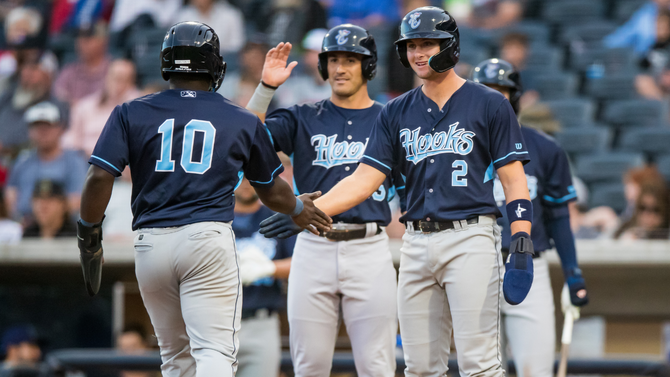Why baseball's next unionization effort could come from MLB front offices: 'We're not protected at all'
There is an emerging appetite for unionization at a time when a labor movement is growing in the sport

You've landed your childhood dream job, or at least your dream job since your Little League coach pointed out you couldn't hit fastballs: you've been hired to work inside a Major League Baseball team's front office. You log long hours and stomach meager pay to climb the organizational ladder. Your performance is commended, to the point that you're told you're getting a new, more impressive title. Except the whole deal is a ruse. You've been had. The new title doesn't come with much of a raise, just a tether to keep you in place.
This is not a hypothetical for some MLB front-office employees. They, or someone they work with, have lived it. Though their careers may seem like dream jobs to outsiders, some of those who have been inside baseball tell a different story, one sprinkled with the pitfalls of working within a closed system.
Unlike in most other fields, front-office employees are not free to shop their labor or entertain competing offers in a meaningful manner. Teams must request permission to interview another club's worker while they're under contract; teams are under no obligation, however, to say yes, or to even inform the employee of outside interest. There is a tacit understanding that workers will be given the option to interview if the job is a clear promotion, yet the industry's rampant title inflation doubles, in a sense, as a control mechanism.
"[We're] going to make you Super Senior Director of X, we're going to make up that title for you," a former front-office member who worked in baseball operations told CBS Sports. "And then that backfires on people."
A lofty title, no matter the actual significance of it, makes it easier for teams to dismiss opportunities as lateral moves, denying their employee the chance to choose.
Baseball is a lot of things, including a collection of unions: from the players and umpires to the concession workers and broadcast technicians. Front-office workers are one of the industry's few prominent groups to not be organized. The "promotion in title only" trick is just one of the ways that baseball's inconsistent, one-sided, and oft-shrouded practices have put front-office employees -- scouts, analysts, database programmers, business directors, HR administrators and others -- at a disadvantage in workplace affairs.
"We're not protected at all," a current front-office worker said.
CBS Sports is unaware of any ongoing efforts to organize front-office workers. Still, conversations with roughly a dozen individuals with experience within the game revealed an emerging appetite for unionization at a time when a labor movement is sweeping the league. A few sources acknowledged informally discussing the possibility with their peers.
The MLB Players Association was involved in several notable developments last year, beginning with the union holding firm during the owner-imposed lockout. The players did not fold and accept what they deemed unsuitable terms, even as the regular-season schedule was compromised by a work stoppage for the first time since the 1994-95 strike. Over the summer, the MLBPA announced it stood in solidarity with Dodger Stadium concession workers who threatened a strike ahead of the All-Star Game. (The employees, having achieved substantive progress toward a new contract with Levy Restaurants, worked on.) Then, in the fall, the MLBPA helped minor-league players take the historic step of unionizing, a decision that culminated this spring with the ratification of their first Collective Bargaining Agreement.
Those developments, and others, have not been lost on front-office workers. They've grown discontent during the Pandemic Era for various reasons, some universal, some local to baseball. They feel overworked and undercompensated. They take exception to the restrictive contracts and other turbid processes that have inspired a past lawsuit. And they are skeptical about what the future holds for them in an industry that offers few assurances beyond a growing hostility toward the people who keep it running everyday.
'You really wonder why you went into the sports industry'
Amateur scouts, long portrayed as the sport's backbone, best exemplify the struggles of the contemporary front-office worker. Despite giving their lives to the industry, their jobs are forever teetering on the brink of extinction. A scouting official explained to CBS Sports that workloads and payouts vary based on an amateur scout's team, experience level, and "area"-- the geographical range the scout is in charge of exploring for talent. A scout based in a hotbed, say the Tampa Bay region, can be on the road and attending games, practices, and workouts up to six days a week. Those individuals grind from January until late November, at times compiling 12-hour days or longer.
The workload is not accompanied by proportional pay. The scouting official estimated that first-time scouts make around $50,000. (That figure used to be lower, at times substantively so, before the Obama administration passed a law expanding overtime eligibility.) More practiced scouts can make $85,000 or more, but meaningful job security is hard to obtain. Almost everyone below the executive level works on an at-will or one-year arrangement. Multi-year contracts, said to be rare by several sources, are often one-year deals with club options tacked on, thereby creating only the illusion of surety.
Scouts are hardly the only ones in baseball who grind. A former high-ranking business executive described a typical day: arrive before 9 a.m. and leave after 10 p.m. on home game days. When they exited the industry because of the time demands, their colleagues expressed jealousy. A career in a baseball front office is taxing enough on the individuals, let alone their families. "It makes you really wonder why you went into the sports industry in the first place, and specifically baseball," the former business executive said.

In-demand workers do not face a more favorable dynamic. A source recounted hearing about an employee who was approached by a superior about an interview opportunity with another club. When the employee requested time to think it over, the superior advised the employee to weigh how taking the interview without landing the job might impact their standing. Another source confirmed hearing similar stories, with superiors warning employees that taking an interview would give the impression they no longer wanted to work for the team -- something that could come up when it came time for promotions and contract renewals, exacerbating already stressful and opaque processes. "It's very, very threatening and coercive," the first source said. Another source added: "It's looked down upon if you're looking at other jobs."
Letting one's contract lapse in an effort to achieve "free agency" is not a wise decision under the current system. In theory, it unburdens the employee of restrictions; in practice, it can lead to them having no chair when the music stops playing. "It's a huge risk filled with uncertainty," a former front-office member said. "Even when you have a strong network to go to for leads, these roles are few and far between and volatile at best." Other sources echoed the sentiment, noting how hard it is to regain entry to the industry after a break, voluntary or not.
The system is closed off to employees in other ways, too. Players are evaluated largely through objective means. Teams have their proprietary algorithms, and their own sets of predilections, but there's only so much room for interpretation. The same is not true with most front-office workers. Their contributions are impossible to measure in straightforward ways. To judge their performances is to make a subjective call that can be swayed by irrelevant factors. "There's a scoreboard in literally every sales department telling you where you stand with your team, with your peers. That's an easy one," the former business executive said. "But how do you do that for the promotions team? How do you do that for HR? How do you do it for community affairs?"
And how do you do it for an analyst? A database programmer? A scout? Some draft picks require two presidential terms before they can be declared a success or failure, to say nothing of the larger processes at play -- scouts don't get every player they want, and teams sometimes draft players they don't want. Regardless, teams are making decisions each fall that alter or end careers. Even those entrenched within the industry acknowledge it's an imperfect process. "It's hard to say someone's not a good scout," the scouting official said.
The front-office workers who spoke to CBS Sports do not view unionization as the cure for all the industry's ills -- the long hours and underwhelming pay; the lack of security and transparency with employee movement; and so on. They do, however, see organizing as a potential means to improve their workplace conditions, and to curtail insidious practices that have taken root. They believe the rewards would be worth the risk. It's possible they may not have a choice.
'You're not really rewarded for it'
In 2016, front-office workers unsuccessfully tried to push back against the baseball industry's unfair practices through litigation. Judge Paul G. Gardephe, originally nominated for his seat on the District Court for the Southern District of New York by former President George W. Bush, dismissed a class action lawsuit filed against MLB by two former scouts who alleged the league and its teams had violated both antitrust and wage-and-hour laws.
The individuals were Jordan Wyckoff and Darwin Cox. Wyckoff, who had been a northeast area scout for the Royals, claimed to make $15,000 a year. He did not receive overtime compensation despite "often" working more than 40 hours a week by crossing state lines to attend games, showcases, and practices. When his contract expired in October 2013, he was unable to secure another scouting job, according to the lawsuit. By then, he claimed, the other teams had filled most of their vacancies. Cox, who had served as a scouting supervisor with the Rockies for two decades before his contract expired in 2011, claimed to make $63,500 a year.
Wyckoff and Cox's suit took aim at, among other aspects of life inside the game, the legality of Major League Rule 3(k), the clause in the Uniform Employee Contract that prohibits teams from talking to another club's contracted workers without permission. The suit noted that MLB controlled "all or virtually all of the market for the purchase of baseball scouting services," and accused teams of having an agreement to "maintain baseline compensation levels" for various positions to suppress wages.
The lawsuit invoked the Curt Flood Act, a 1998 piece of antitrust reform named after the player who sued MLB to end the reserve clause. Judge Gardephe did not find the case convincing enough to transform the Wyckoff and Cox suit into the front-office employee equivalent of Flood's historic triumph; instead, he reinforced that teams were behaving within their rights set forth by MLB's antitrust exemption. "Because scouts' work has a direct and critical effect on the selection of players who will participate in the games that the public will watch," Gardephe opined, "their role cannot be characterized as 'wholly collateral' or 'incidental' to the business of professional baseball."
Nathaniel Grow, an Associate Professor of Business Law and Ethics at Indiana University and occasional author at FanGraphs, told CBS Sports that MLB's antitrust exemption was one of several hurdles facing the lawsuit. "Even if that antitrust exemption didn't exist, they still have to prove that whatever the teams were doing was actually anti-competitive and didn't have offsetting or counterbalancing justifications for it," he said. Restricting in-season movement, for example, is probably justifiable on the grounds that it prevents teams from, say, hiring all of their rivals' scouts the week before the amateur draft begins.
With legal recourse off the table, front-office employees have few other cards to play. Organizing is possibly the most effective of them. To paraphrase Grow: if a practice is just annoying, but not technically illegal, then unionizing makes more sense than suing. "Annoying, but not technically illegal" is a fitting description for other behaviors that have left front-office employees cold.
Most teams handed down front-office furloughs and layoffs during the COVID-19 pandemic. Some teams were seen as taking it further than others. The example that surfaced most often during interviews conducted for this piece entailed the Rockies using their full-time analytics staffers as clubhouse attendants. Those employees spent their days running statistical reports for the organization, and their nights cleaning uniforms and performing other tasks that were not associated with their actual jobs. "They shouldn't be able to do that," said Daniel R. Epstein, the president of the Somerset County (N.J.) Education Association and an author at Baseball Prospectus. "If they had a union, the union would say, 'No, this is not in their job description.'"
"Having better insurances and protections from teams is really all people want," another source said. "They want to feel like the investment that we're making is going to be returned by these billion-dollar businesses."
Asking employees to go above and beyond on occasion is one thing. But teams have made those requests while conducting other business that has left workers concerned. In 2014, MLB owners voted to allow teams to "slash or eliminate pension-plan offerings to their non-uniformed personnel," according to ESPN. Functionally, non-uniformed personnel meant scouts, front-office and minor-league staff, secretaries -- almost anyone not protected by a union.
A labor economics expert told ESPN at the time that the owners' decision seemed "especially malevolent" given the league's good financial standing. Commissioner Rob Manfred, then MLB's chief operating officer, stressed that teams were "free to leave their plans exactly where they are," and noted that, up to that point, no team had made a change. Two sources verified to CBS Sports that only a handful of clubs have since kept the pension plan intact. The league's financial health has seemingly improved, with Forbes reporting that MLB set new record revenues last year, "exceeding $10.8 billion."
"[The owners] are bragging about record profits or sellouts, and then you get a 1.5% raise. Maybe that could be the way I do my job, maybe I'm not as good as I think I am," a current front-office staffer said. "We give these organizations our lives, practically, and you're not really rewarded for it."
A dollar saved appears to be worth two earned. The success of small-budget teams and pathbreaking front offices has created a convenient cover story for teams looking to slash costs in their scouting department. Emphasizing the use of data and video analysis reads well on paper. More information is almost always better. But some teams are not supplementing by adding more information; they're making a trade-off and prioritizing the cheaper sources.
Multiple sources told CBS Sports that at least one team does not send its scouts to cover college or pro games (where data and video are more readily available) to cut down on overhead costs. That same club has been rumored to employ a hybrid approach to its scouting department. Whereas every team used to have two scouting staffs -- one focused on the amateur side, the other on the pro -- this club has merged them into a single staff. Voila. Now, they have a reduced headcount, even if that leaves their remaining scouts with a greater workload.
It stands to reason that cost reductions will eventually hit other departments. The next target may already be in sight. The Athletic recently documented comments Manfred relayed during an executive luncheon from an unnamed owner. "You know, I don't know what this analytics thing is, but I have, like, 75 guys," Manfred said he heard from the executive. "What I want to do is, I would spend a week in the analytics department. I was going to figure out what the hell these guys do."
The question front-office workers have to answer, then, is what the hell they have to do to protect themselves before it's too late.
What comes next?
To paraphrase Tolstoy: all unionization efforts resemble one another. When CBS Sports asked the front-office workers interviewed for this article what they would want to gain from a union, they gave the same universal answers that have been associated with organization efforts since the dawn of collective labor: more pay; fewer hours; more transparency with promotions and retention; a better system for pursuing or changing jobs.
"People all want and have the same wants and needs in their workplace," Epstein said. "They want to be treated fairly, they want to be safe, they want to be paid what they're worth to themselves as individuals and what they're worth to the company. When those things aren't happening, then people tend to unionize."
Certain macro conditions can serve as unmoved movers. Epstein theorized that employees tend to unionize when they're facing extreme economic conditions: either when times are good -- unemployment is low and opportunities abound, creating leverage for change -- or, when times are bad and it feels as though there's nothing to lose anyway -- akin to the Great Recession.
This would appear to be a prime time to organize based on the news cycle. Every week for the past year seems to be accompanied by a unionizing victory at Amazon, Starbucks, or elsewhere. The national-level data is more of a mixed bag. The National Labor Relations Board reported last October that their field offices had received 53% more union representation petitions during the 2022 fiscal year than they had in 2021. Elsewhere, a Gallup poll found that more Americans held a favorable view of unions than they had at any point since 1965. Conversely, the percentage of unionized workers dropped to 10.1%, the lowest on record as non-union jobs outpaced the growth of union jobs.
Even if the circumstances are idyllic, organizing an industry as large as baseball is far from a cakewalk. There are myriad challenges to overcome, beginning with the temperament within an industry that is said to favor rugged individualism. It's a highly competitive field, in terms of both who gains entry and who advances. Teams use those dynamics to create distance and friction between employees, all of whom want to protect their spot. "No one in baseball talks about their salary," said one source. Another, a player development staffer, added: "It's been a cutthroat industry for a good bit."
Baseball's demographics play a role, too. An anonymous labor lawyer who spoke to CBS Sports noted that it's rare to see white collar office professionals organize. Not because of any practical reason, but because "people in certain kinds of jobs are conditioned to see themselves as not needing a union." Times could be changing in that respect. Workers in the video game industry, where employees are also often exposed to long hours and minimal protections, have made progress in unionizing while facing some similar issues.
Of course, not every front-office worker will jump aboard, right away or at all. Epstein predicted some workers would veer in the other direction, sensing an opportunity to curry favor with management by opposing the union effort.
"Right now, we have a lot of people who are there because they love the sport, but also because they feel as though they're lucky to be there," the former business executive said of baseball's landscape. "And the industry loves the fact that you're thrilled to have that logo on your business card."
Several sources spoke about the need for bridgers, individuals who can connect people within a front office or within the industry as a whole. It's up to those individuals to inspire buy-in and convince people to come together for a common cause. Outside parties can help, to an extent, but Epstein said "it probably will take a few people who are in front offices to really build this into something." The scouting official, meanwhile, estimated that it would take a handful of highly respected scouts to get behind the idea for it to gain momentum and credibility. Otherwise? "People are going to get laughed at."
Ideological clashing is not the only issue at hand. There are enough practical and logistical problems to keep organizers busy. One of the most pressing is whether front-office workers would be able to form one overarching union, or if they would need to organize each individual front office. Another is who, precisely, would be allowed into the bargaining unit, since rampant title inflation makes it tougher to separate the employees from management. And then there's the big question: would MLB voluntarily recognize such a union?
Bear in mind, MLB's voluntary recognition of the minor-league union came after the league spent years and millions of dollars opposing change through legislative efforts. The Save America's Pastime Act, which stripped minor-league players of federal minimum wage protections, was signed in 2018. MLB reportedly spent around $3 million combined on lobbying expenses in 2016 and 2017, a significant increase compared to the $330,000 they spent in 2015, according to the Associated Press. Those lobbying efforts spurred the need for and the formation of the minor-league union in the first place.
There are several key differences between the plight faced by minor-league players and that of front-office workers. The most notable of which is that the former became a clear public relations loser for the league. The average fan is unlikely to be as concerned with anonymous staffers making more than $50,000 as they were with minor-league players living in squalor after being denied the federal minimum wage. The same may apply to MLB players.

The MLBPA joined the American Federation of Labor and Congress of Industrial Organizations (AFL-CIO) last September, but it's unclear how involved they'll be in others' causes. Executive director Tony Clark offered some caveats at the time, noting there would be times "reflective of the language that we have in our agreement" where players may have to cross picket lines. It's conceivable that the players may opt against helping out front-office workers who, in certain cases, have helped suppress their wages. On the other hand, perhaps those players would recognize that the front-office workers had been fed the same "fairy tale" Marvin Miller described in his day, about baseball not being a profitable business for owners.
"[It's] entirely possible that MLB would not want to wage a public fight over unionizing when its most visible employees at the center of its business are all union," the labor lawyer said. "But that might depend a lot on whether MLBPA is willing to bang the drum on behalf of the front-office workers."
There are always other unions the front-office workers could approach for backup. The labor lawyer suggested that the Office and Professional Employees International Union (OPEIU) could make sense. The United Steelworkers (USW) would also seem like a compelling candidate; the group supported the Northwestern college football players during their unionization attempt, and even had discussions with the minor-league players ahead of their own efforts. The question is whether any of those unions would carry the same cachet in MLB's mind as association with the MLBPA. ("The outcome of the meeting was effectively that the organizing director concluded that nothing would succeed without the MLBPA," activist Bill Fletcher Jr. told The Athletic last October of the get-together between the USW and the minor leaguers.)
The hangups and potential difficulties associated with the formation of a front-office workers union did not stop several sources from expressing hope that the minor-league union could galvanize workers. One source, who predicted earnest unionization efforts would begin within seven years, said: "What you saw were some of the most vulnerable people in an organization banding together, recognizing and understanding how much they're being taken advantage of, comparing it to other industries, and pushing back -- for the better." Another theorized that affiliate-level workers, who will see firsthand how players benefited from representation (including a doubling of their salaries), could raise the issue as they make their way to big-league jobs.
Perhaps the most important lesson that can be learned from the minor leaguers is that the pace of unionizing can, occasionally, resemble the old Hemingway quote: gradually, then suddenly. A minor-league union was unrealistic until it wasn't. The same might someday prove true for front-office workers. At minimum, many seem to realize that the problems with the baseball industry -- the hours and pay, the lack of security and transparency, and so on -- won't be solved by the system that created them. Perhaps front-office workers will never find a way to unionize, but there is a kindling sentiment that something can and should be done to change the industry for the better.
"It's probably my fault for working in this industry," a current front-office worker said. "I just think it's bullshit."


















